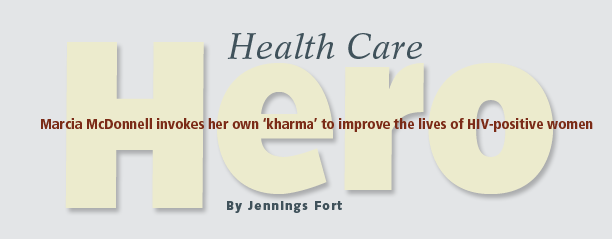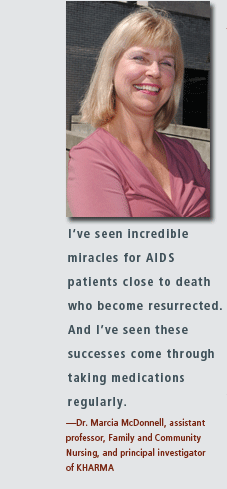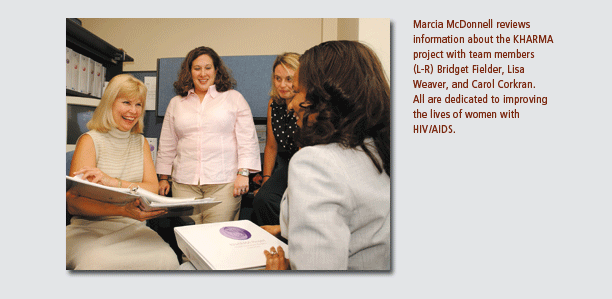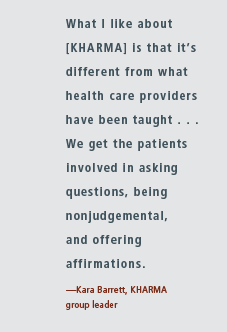













|
 |
 |
 fter
Dr. Marcia McDonnell became a nurse 31 years ago, she knew she loved
direct patient contact and assessment. But when she began working
with HIV-positive women in 1990, she found her passion. fter
Dr. Marcia McDonnell became a nurse 31 years ago, she knew she loved
direct patient contact and assessment. But when she began working
with HIV-positive women in 1990, she found her passion.
McDonnell, assistant professor in
the Department of Family and Community Nursing, is building on her
clinical and research experience to help underserved HIV-positive
women with an innovative research program—“Keeping Healthy
and Active with Risk Reduction and Medication Adherence” (KHARMA).
As a nurse practitioner, she cares for HIV patients one day a week
at the Ponce de Leon Center, an outpatient HIV/AIDS clinic operated
by Grady Health System. She also teaches master’s and doctoral
courses in the School of Nursing.
Last spring, McDonnell’s passion
won her the Atlanta Business Chronicle’s “Health Care
Hero” award, which recognizes several categories of health
care excellence in the Atlanta area each year.
“Being recognized as a Health
Care Hero is really an honor and also a very humbling experience
because the providers and researchers whom I work with are all excellent
in what they do,” she says. “I've worked with HIV-positive
women for a long time, and [receiving the award means] my work has
been acknowledged and rewarded.”
McDonnell’s longtime interest
in medication adherence and in women with HIV made KHARMA a natural
progression in her career.
“I’m committed to this
work,” she says. “I’ve seen incredible miracles
for AIDS patients close to death who become resurrected. And I’ve
seen these successes come through taking medications regularly.”
KHARMA, which began in 2003, is funded
by a four-year, $1.9 million grant from the National Institutes
of Health (NIH). After the initial pilot period, studying processes
and procedures, the study’s main phase began in January 2005
and continues until 2007. Dr. Martha Hare, program director at the
NIH’s National Institute of Nursing Research (NINR), says
women in the Southeast are among the fastest-growing HIV subpopulations.
Until recently, interventions targeted to this group have been lacking.
“This study is in line with
NINR's commitment to reducing health disparities in general,”
she says, “as well as improving treatment adherence and reducing
risk among vulnerable populations specifically affected by HIV/AIDS.”
GET BUSY LIVING
 cDonnell
gained valuable research experience in HIV medication adherence
by participating in “Get Busy Living,” a joint project
with the Rollins School of Public Health, in 2001. The program promoted
consistent use of the many medications an HIV patient may take daily.
Following the complicated regimen of taking 20 or more pills at
specific times, with or without food, is critical in managing the
disease. Get Busy Living used a “motivational interviewing”
approach of empathic, nonjudgmental counseling with individual men
and women. McDonnell is applying this method to groups of women
in the KHARMA study. Results will be compared to a control group
involving traditional health promotion sessions such as lectures
and discussions on nutrition, exercise, stress, and women's health
issues. cDonnell
gained valuable research experience in HIV medication adherence
by participating in “Get Busy Living,” a joint project
with the Rollins School of Public Health, in 2001. The program promoted
consistent use of the many medications an HIV patient may take daily.
Following the complicated regimen of taking 20 or more pills at
specific times, with or without food, is critical in managing the
disease. Get Busy Living used a “motivational interviewing”
approach of empathic, nonjudgmental counseling with individual men
and women. McDonnell is applying this method to groups of women
in the KHARMA study. Results will be compared to a control group
involving traditional health promotion sessions such as lectures
and discussions on nutrition, exercise, stress, and women's health
issues.
“Marcia is wonderful to work
with,” says Dr. Colleen DiIorio, a joint faculty member in
the schools of nursing and public health and Get Busy Living principal
investigator. “She is detail-oriented and understands the
research. She has both the skills of a researcher and a clinician
and really knows how to use them together.”
The KHARMA team focuses on patients
at the Ponce Clinic. Taking medication correctly is only one challenge
most of the women face. Substance abuse, unsafe housing, domestic
violence, and children or partners with HIV are additional concerns.
“Women with HIV have so many
needs,” McDonnell says. “They are often caretakers and
put themselves last. They make sure everyone else is taken care
of before they take care of themselves.
“We want to give patients the
opportunity to choose and empower themselves to take more responsibility.” |
 |
 |
 |
MOTIVATING
PATIENTS WITH KHARMA
 uring
the pilot phase, KHARMA’s nurse facilitators are leading two
groups totaling 16 women. Discussion topics range from using safer
sex/risk reduction behaviors and controlling medication side effects
of diarrhea and nausea to deciding when to disclose HIV status to
family members or sex partners. Patients discuss ways to improve
their motivation and set goals for the week between meetings. The
study also uses cosmetic and beauty consultants and massage therapy
as incentives to reinforce the women’s self-confidence. uring
the pilot phase, KHARMA’s nurse facilitators are leading two
groups totaling 16 women. Discussion topics range from using safer
sex/risk reduction behaviors and controlling medication side effects
of diarrhea and nausea to deciding when to disclose HIV status to
family members or sex partners. Patients discuss ways to improve
their motivation and set goals for the week between meetings. The
study also uses cosmetic and beauty consultants and massage therapy
as incentives to reinforce the women’s self-confidence.
For facilitators, listening, offering
a variety of options, and providing medical advice only with the
patient’s permission are key, says senior research nurse and
KHARMA group leader Kara Barrett. The approach is one of the most
promising she’s seen in her 35 years in nursing research.
“What I like about the program
is that it’s different from what health care providers have
been taught,” she says. “We learned directive care,
telling a patient, ‘here’s what you can do.’ But
it has to come from the patients by partnering with them. We get
the patient involved by asking questions, being nonjudgmental, and
offering affirmations.”
A productive atmosphere of discussion
among facilitators, under McDonnell’s leadership, has also
propelled the study. “She’s an inspirational leader
and team player,” Barrett adds. “She’s always
open to anything you have to say.”
Group attendance has been strong from
the beginning and patients seem invested.
“One of the great things about
motivational intervention is when staff members build a trusting
relationship with patients relatively quickly as we’ve seen
in the KHARMA program,” says Carla Johnson, infectious disease
clinical manager at the Ponce Center. “This is a good predictor
of success.”
Among the initial impressions from
the study is a common theme of spirituality embraced by many of
the patients. McDonnell says the School of Nursing will examine
the data to investigate a connection between spirituality and fewer
episodes of depression. Her team began analyzing the first data
this past fall.
“This study really encompasses
all of the themes our research should reflect,” says Dr. Marla
Salmon, dean of the School of Nursing. “It has the potential
to make a difference in the lives of vulnerable people and sets
an example for students of how rewarding a career in research can
be.
“Marcia is an inspiration to
everyone at the school. As a clinical scholar, there’s no
artificial separation between being a caring professional and a
research scientist.”
With the main phase of KHARMA up and
running in early 2005, the study will include 216 women at the Ponce
Clinic and at the AID Atlanta organization. McDonnell hopes KHARMA
eventually will become a permanent program at both locations.
“The excitement is seeing patients
take these medications consistently and seeing them return to functioning
lives,” McDonnell says. “These successes make this work
rewarding.” 
Jennings Fort is a freelance writer and communications
associate with The Home Depot in Atlanta.
|
 |
|
|
|